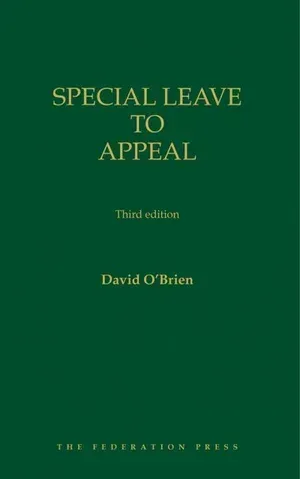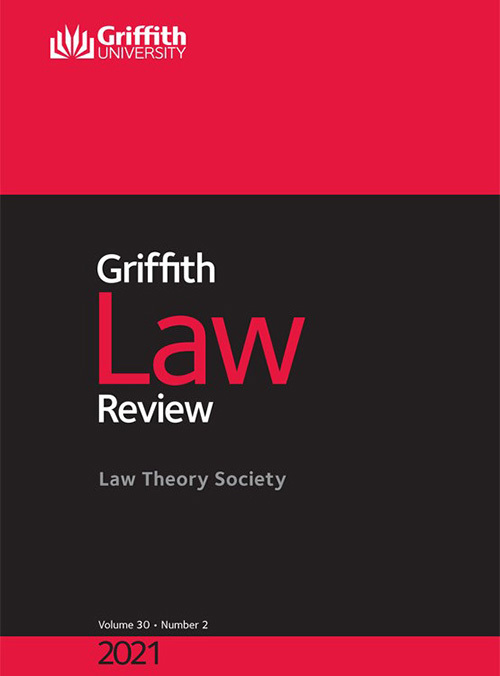
Special Leave to Appeal
By David O’Brien (3rd edition, Federation Press, 2022)
This is the third edition of a work that deals with niche subject matter, but subject matter that is immensely important. As Pincus J observed in the forward to the first edition, for many litigants in Australia the ‘ last nail in the coffin’ is the news that the High Court of Australia has refused special leave to appeal.
At that time of the first edition, most matters were disposed of following a brief oral hearing, although some were disposed of on the papers. Now, however, the tables have turned.
At that time of the first edition, most matters were disposed of following a brief oral hearing, although some were disposed of on the papers. Now, however, the tables have turned. In 2021 for example, 254 applications were dealt with on the papers (of these, there were grants of special leave in only one case), and only 98 applications proceeded to an oral hearing (of which there were grants in only 26 cases). This change in the practice of the High Court necessitates greater attention be given to the written Application for Special Leave.
Central to the grant (or refusal) of special leave is determining whether the proposed appeal is sufficiently ‘special’. While s 35A of the Judiciary Act 1903 (Cth) specifies some criteria to be applied by the court, the list is neither exhaustive nor comprehensive. This work collects together the various authorities that help to explain the features of a case that facilitate the advocate in persuading a panel of the court that special leave ought to be granted, and the features of a case that militate against such a grant.
It begins with a chapter entitled ‘First Principles’ containing matters that are largely of historical interest, but which are nonetheless of practical importance if only to explain the jurisdictional basis for the course adopted in earlier cases. It then has separate chapters that address the criteria as they apply in civil cases, and in criminal cases. A useful chapter entitled ‘Civil Procedure’ then follows, although it should be noted that many of the matters referred to in this chapter will be relevant to criminal appeals as well. A smaller, more narrowly confined chapter entitled ‘Criminal Procedure’ addresses questions of bail, a stay or surrender and extradition orders, and a prisoner’s attendance.
Given the predominance of special leave applications being determined on the papers, perhaps the most significant chapter of this revised edition is the last, entitled ‘Persuasive Submissions’. This is an expanded version of the chapter from previous editions, although it must be said that considerably more can be written on the subject, particularly with respect to written submissions. There remains a need for an Australian work dedicated to the subject matter (mirroring the writings in an American context by Bryan Garner, and in particular his collaboration with the late Antonin Scalia). This chapter is not such a work, but it does helpfully extract passages from a number of articles by Kenneth Hayne, Dyson Heydon and David Jackson which themselves warrant a close and comprehensive reading.
Overall, this is an extremely useful book for both the frequent flyer and the occasional tourist in the special leave lists.

Reviewed by D F Villa SC
Linguistic Diversity as a Challenge for Legal Policy
Edited by Dr Laura Smith-Khan and Dr Alexandra Grey Griffith Law Review, Volume 30, Issue 1 (2021)
Griffith Law Review (GLR) has just published thematic issue on ‘Linguistic diversity as a challenge for legal policy’. As guest editors of the issue, we believe that this is an important topic for legal practitioners and law makers, as they may be unaware of the myriad ways linguistic minorities may be unfairly disadvantaged within legal systems ,effectively undermined in their equal access to justice and full enjoyment of their rights. The issues ought to address ‘language-related concerns in legal contexts and to analyse them in ways informed by both linguistic and legal scholarship.’ and law, we are aware of both the value and need for research to identify and address language-related concerns. Our editorial stresses the importance of examining how our legal system recognises, conceptualises, and accommodates linguistic diversity. It also notes the potential for language-focussed issues to be incorporated more systematically within law school core teaching. A member of our Law and Linguistics Interdisciplinary Researchers’ Network, former Federal Court justice, the Hon Peter Gray AM, reflected during an earlier collaboration that our work could be conceptualised across the three branches of the state to make it accessible to our fellow legal practitioners. We took up this suggestion in the thematic issue, with articles on the use of language by the courts, legislature and executive.
The first section of these peer-reviewed articles explores language and policies governing the judiciary and courts
First, Alex Bowen, a PhD candidate and legal practitioner with extensive experience in the Northern Territory (NT), explores the language of police cautions, in ‘Explaining the Right to Silence under Anunga’. He linguistically analyses NT police caution transcripts, alongside a critical examination of historic and current common law, legislative, and policy-based controls. He concludes that notwithstanding changes over the last 40 years, inequality remains, and he identifies a number of possible improvements.
Drawing on a wealth of practical experience as a senior manager for the Aboriginal Interpreter Service, criminal lawyer, law lecturer, and now CEO of Aboriginal Resource and Development Services, Ben Grimes examines the different rules and models for providing translation and interpreting services across Australian courts. This includes reflecting on his own contributions to the successful NT model of publicly funded ‘duty interpreters’.
Also exploring interpreting but this time from the interpreters’ perspective is Dr Jinhyun Cho, a senior lecturer in Macquarie University’s Translation and Interpreting program. Drawing on research that is part of her latest book, she shares findings from interviews with Australian court interpreters. Based on this data, Cho argues that misguided institutional beliefs about language and about interpreters still negatively affect interpreters’ participation in court processes. In particular, she identifies three key problematic assumptions: that a person’s accent can be used to evaluate their English language proficiency; that each language has one standard version without room for variety; and that people from minority backgrounds should be able to effectively use the national language of their country of origin when participating in court. When explored in relation to the power dynamics of court, these assumptions are found to undermine the participation of not only interpreters themselves but also witnesses and defendants. An apt example is that of Italian language interpreters who report emotional witnesses shifting from standard Italian into, for example, Sicilian or Calabrian dialect, without other court participants appreciating the difficulties this creates for interpreters who are not proficient in these dialects. She concludes that there remains room to improve the way lawyers and judges interact with courtroom interpreters, especially in terms of briefing/preparation, for the benefit of the administration of justice.
The next section of the thematic issue explores rules governing executive or administrative processes. Dr Smith-Khan examines registration rules for registered migration agents. More specifically, she explores the requirements for newly registering agents to prove their English language proficiency, contained within recent legislative instruments. Taking up concerns expressed by the federal Parliamentary Joint Committee on Human Rights’, and drawing on linguistic scholarship, I challenge the immigration minister’s justifications for creating different proof requirements based on country of origin.
Next, Dr Alexandra Grey, and Dr Alyssa Severin, a linguist at Macquarie University, share a 2019–20 audit of legislation and policy affecting NSW government public communications in languages other than English (LOTEs). They find significant gaps in these frameworks, which mean that public LOTE communications are not systematically planned for or quality tested. (Grey and Severin have also published a follow-up article analysing the NSW Government’s LOTE practices in a subsequent GLR issue.) Their findings are particularly pertinent in light of widely reported 2020–21 shortcomings of NSW and other Australian governments communicating in LOTE about COVID-19. The issue’s third section presents two articles that focus on parliamentary law-making processes. First, Julian R Murphy, who is a PhD candidate at Melbourne Law School and Victorian barrister, considers the increasing presence of Indigenous-language text in Australian legislation. In response to concerns about how courts should interpret such texts, he proposes that existing Australian jurisprudence on interpreting multilingual international treaties could provide useful precedents. He persuasively draws on a legislative case study to demonstrate how this could work.
Finally, historian Dr Imran Ahmed, currently based at the National University of Singapore’s Institute of South Asia studies, shifts our focus to another legal context impacted by British colonialism: Pakistan. Mapping constitution-making and political debates from Pakistan’s creation to present time, he demonstrates how language policy and religious identity are closely intertwined, and politicised, in nation-building and constitutional law.
Along with these peer-reviewed articles, we were lucky to have a non-traditional piece included in GLR’s ‘Open Space’ section. This is a reproduction of a public lecture given by Bill Mitchell OAM, principal solicitor, Townsville Community Law, at James Cook University (JCU) to celebrate the new Human Rights Act 2019 (Qld). In this fascinating speech, he explores another intersection of linguist diversity and law, reflecting on how speech pathologists effectively protect and promote human rights through their work. Mitchell explains that communications rights are a ‘gateway’ to many other human rights.
The thematic issue finishes with reviews of two new academic books. Ana Bruzon, a PhD candidate at Macquarie University, reviews Janny HC Leung’s book, Shallow Equality and Symbolic Jurisprudence in Multilingual Legal Orders (OUP, 2019). Leung’s extensive work spans legal policy across all branches of the state, across the globe. Gareth Lloyd, a speech pathology lecturer and law student at JCU, reviews the prominent Australian academic, Georgina Heydon’s, book, Researching Forensic Linguistics: Approaches and Applications (Routledge, 2019), which provides an excellent introduction to methods for examining language in legal settings, particularly in criminal law processes.
We are excited and proud to have edited this thematic issue for GLR, the very first in the journal’s history to focus exclusively on the justice implications of linguistic diversity. Bringing together early career researchers and practitioners with expertise across a broad range of disciplines, topics and methodologies, we hope to demonstrate the enormous scope there is for interdisciplinary research to make valuable contributions to legal policy reform and improved legal practices.
This GLR thematic issue is accessible via most Australian University library sites. Links to free copies of many of the included works are found at www.languageonthemove. com/linguistic-diversity-as-a-challenge-for- legal-policy or contact the editors directly about access: laura.smith-khan@uts.edu.au; alexandra.grey@uts.edu.au
Overview by Dr Laura Smith-Khan and Dr Alexandra Grey, chancellor’s postdoctoral research fellows in the Faculty of Law at the University of Technology, Sydney. As guest editors of the GLR thematic issue, they provide an overview rather than a review of this collection.

